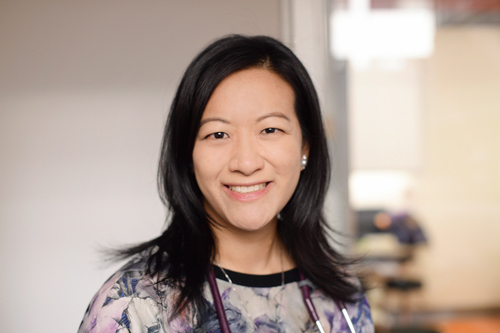Fall 2016 (Volume 26, Number 3)
CRA Pediatric Rheumatology Education Update: Connecting Communities for Continuing Education and Patient Care
By Mercedes Chan, MBBS, MHPE, FRCPC
Download PDF

Learning has long been espoused as a social activity, and in Canadian pediatric rheumatology, the development of community to foster learning has made leaps and bounds in the last few years. Modern technology has greatly contributed to this process, and this is perhaps no better exemplified than by the Pediatric Rheumatology Prairie Rounds. Every Tuesday, the pediatric rheumatology teams in Calgary, Edmonton, Saskatoon and Winnipeg – the “Prairie Group” – convene in a videoconference to discuss cases and research. The premise for these rounds – which are an accredited Royal College learning activity – was to provide a platform for smaller centres to support each other in their clinical and academic activities. The rounds feature faculty and trainees from each of the prairie sites, as well as speakers from related specialties such as ophthalmologists, pathologists, radiologists, medical educators and visiting international and Canadian speakers. Twice a quarter, these rounds also provide a venue for a journal club, hosted by rotating centres. Most importantly, though, these rounds provide an opportunity for the prairie teams (including their allied health staff) to get to know one another and learn with and from one another. Presentations from the last year include sharing practices around joint injections and casting, uveitis updates, best practices in providing feedback and pathology rounds focused on myositis.
At a national level, plans are underway to increase dialogue with referring physicians, namely pediatricians and pediatrics trainees, through the formation of a special interest group in pediatric rheumatology within the Canadian Pediatric Society (CPS). The CPS is the major pediatrics association in Canada and plays a large role in advocating for the health of Canadian children with government. Having a voice within the CPS would provide further opportunities to advocate for children with rheumatic disease, endorse practice guidelines, and provide exposure to and education around pediatric rheumatology. At present, no formal rheumatology representation exists, something both the CPS and Canadian pediatric rheumatologists recognize to be an area of need as pediatricians form a substantial percentage of the pediatric rheumatology referral pool. Many pediatric rheumatology members of the Canadian Rheumatology Association have expressed interest in forming the core membership of a special interest group with hopes to have a formal group established in anticipation of the 2017 CPS annual meeting.
Finally, Canada continues to be recognized as providing centres of excellence for training in pediatric rheumatology for Canadian and international trainees alike. Recent years have seen trainees from India, Korea, Thailand, Saudi Arabia, Australia, Switzerland, Qatar, Germany, the Netherlands, Israel, Kuwait, Palestine, Singapore, Argentina and Kenya; see related article by Dr. Deb Levy on p.18. Many trainees from developing countries return to their home countries often to become one of only a handful of pediatric rheumatologists – or sometimes the first for a region – establishing divisions, fellowship programs and research registries. International trainees help to build a growing network of pediatric rheumatologists worldwide, thus expanding our community for collaboration and education, while ultimately improving access to and capacity for caring for pediatric rheumatology patients worldwide.
Mercedes Chan, MBBS, MHPE, FRCPC
Assistant Professor of Pediatrics, University of Alberta
Pediatric Rheumatologist,
Stollery Children’s Hospital
Edmonton Alberta |